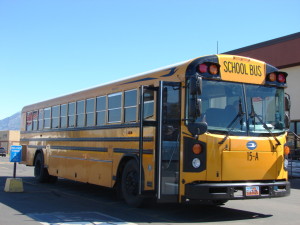
I’ve written before of an afternoon with Cesar Chavez at UFW headquarters on the edge of the California desert. The year was 1981, and there was strong hope of putting a school choice initiative on the ballot.
Chavez, his nephew and I spoke of empowering farm workers with an educational option. On the one hand, if they wished, they could continue to educate their children in a string of disconnected public schools located in diverse districts along the seasonal harvest path north. On the other, they could choose among public and private schools travelling in buses, either parked in coordination with the parents’ location, and/or actually operating in moving buses variously designed for the purpose of schooling.
Chavez was warm, receptive – and frustrated. His impediment was the annual $200,000 he received from Albert Shanker and the AFT. So he said, and I believed him. I suppose the AFT still protects its monopolies in similar ways. I see no legal impediment except, possibly, the anti-trust laws.
Peripatetic schools in buses? I think so.
Most of the mobile schoolhouses would teach only when parked in a location convenient to the parents’ current worksite. Whether the bus was equipped actually to provide education en route could be one element of choice for the parents. What would, I think, be the central advantages of either style are two: the convenience of location near the parent and continuity of atmosphere and substance – the same room, books, teachers – everything about the school itself – plus the settling confidence of the child in the parents’ proximity.
To this I would add in the reduction in systemic public costs made possible by liberating school districts from the expense and complexities of providing space and whatever other necessities – a teacher, or several – for a new gang each week or 10 days. It could be a relief to all concerned to be able to offer parents a school appropriate to their child’s age, and consistent in its milieu and message.
School reformers could seriously consider – as a potential reform to both policy and politics – the convening of well-publicized conferences to consider the question of the most promising forms of itinerant schools for farm workers’ children. So far as I know, they have yet to model and critique the potential variety of such novelties as tools of wise educational policy.
The politically easiest path to such reform at the moment would be various forms of charter schools.
Though essentially private, they are labeled “public” and avoid constitutional menace by excluding religion. I see no barrier to the creation of a new such “public” sector by those clever folks who have given us the very successful charters in our major cities. The UFW itself would be eligible to undertake the mission. Let labor sit down with capital; they might learn from one another.
The farm laborers of California – and doubtless elsewhere – would be likely to sense an opportunity to express their religious faith to their children in a coherent curriculum. I can think of no more appealing context in which to raise, in a serious way, the issue of whether charter schools are, indeed, public in any way that forbids public assistance to parents who want religious education.
There is presently very serious thinking and writing in process to address that question – and the even broader one of a constitutional duty of government to allow such schools a practical existence as charters. After all, the power to force the poor into state institutions called “public schools” can seem a rather peculiar way to respect the First Amendment’s rejection of laws “prohibiting the free exercise” of one’s faith.


